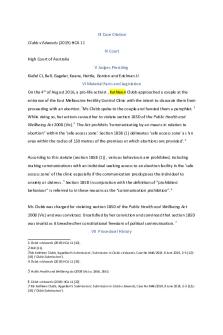Dickinson v Dodds case note PDF

| Title | Dickinson v Dodds case note |
|---|---|
| Course | Contracts |
| Institution | University of Sydney |
| Pages | 2 |
| File Size | 108.4 KB |
| File Type | |
| Total Downloads | 78 |
| Total Views | 155 |
Summary
Download Dickinson v Dodds case note PDF
Description
CASE: Dickinson v Dodds (1876) 2 Ch D 463 ‘selling house/offer’ Precedent: an English contract law case, heard by the Court of Appeal, Chancery Division, that held that notification by a third party of an offer's withdrawal is effective just like a withdrawal by the person who made an offer. A promise to keep an offer open (an option) is itself a contract which must have some consideration. Facts: •
On Wednesday 10 June 1874 Mr Dodds delivered Mr Dickinson an offer to sell some houses for £800, an offer open until 9am on Friday 12 June.
•
On Thursday afternoon, another man called Mr Berry told Mr Dickinson that the houses had already been sold to someone called Mr Allan (who was the second defendant).
•
Mr Dickinson found Mr Dodds in the railway carriage at 7am on Friday, leaving Darlington Railway Station, and gave his acceptance there.
•
But Mr Dodds said it was too late. Mr Dickinson sued for breach of contract.
Issue: Whether the defendant’s promise to keep the offer open until Friday morning was a binding contract between the parties and if he was allowed to revoke this offer and sell to a third party. Judgement: HELD James LJ •
Although the document said "I hereby agree to sell ...", it was only an offer. The fact that it was "left over" until 12 June makes this clear. There was no consideration to keep the property unsold until 12 June, despite the fact that one or maybe both of them thought that at least there was some obligation. "It is clearly settled law, on one of the clearest principles of law, that this promise, being a mere nudum pactum (promise without consideration) was not binding."
•
There is no authority which requires an express retraction. P knew that D no longer wished to sell the property to him. Prior to the purported acceptance of the offer, P knew that D had revoked it. This knowledge made the revocation effective.
•
The offer might be withdrawn at any time before acceptance, since there was no consideration for the promise to keep the offer open until 9 a.m. on the Friday. Had it, in fact, been withdrawn?
Principle:
•
The offeror is free to withdraw the offer at any time before acceptance takes place unless a deposit has been paid.
•
An offeree must have knowledge of a revocation, but explicit communication is not required.
•
Communication of the withdrawal of the offer can be made by any reliable third party. Option must have consideration to be binding.
•
The court held that the statement made by Mr Dodds was nothing more than a promise; there was no binding contract formed.
•
He had communicated an offer for buying his house to the complainant and this offer can be revoked any time before there is acceptance.
•
There was no deposit to change this situation. Thus, as there was no obligation to keep the offer open, there could be no ‘meeting of the minds’ between the parties...
Similar Free PDFs

Dickinson v Dodds case note
- 2 Pages

Nydam v R CASE NOTE - case note
- 3 Pages

Paul v Constance Case Note
- 6 Pages

Case Note - R v Clarke
- 1 Pages

Walsh v Lonsdale - case note
- 2 Pages

Curran v Collins case note
- 5 Pages

Case Note - Allcard v Skinner
- 2 Pages

CASE NOTE W v Boland
- 3 Pages

R v Clarke case note
- 2 Pages

Thorne v Kennedy case note
- 3 Pages

Clubb v Edwards Case Note
- 3 Pages

Case note final - case note
- 12 Pages

Formative Case Note - Case note
- 1 Pages
Popular Institutions
- Tinajero National High School - Annex
- Politeknik Caltex Riau
- Yokohama City University
- SGT University
- University of Al-Qadisiyah
- Divine Word College of Vigan
- Techniek College Rotterdam
- Universidade de Santiago
- Universiti Teknologi MARA Cawangan Johor Kampus Pasir Gudang
- Poltekkes Kemenkes Yogyakarta
- Baguio City National High School
- Colegio san marcos
- preparatoria uno
- Centro de Bachillerato Tecnológico Industrial y de Servicios No. 107
- Dalian Maritime University
- Quang Trung Secondary School
- Colegio Tecnológico en Informática
- Corporación Regional de Educación Superior
- Grupo CEDVA
- Dar Al Uloom University
- Centro de Estudios Preuniversitarios de la Universidad Nacional de Ingeniería
- 上智大学
- Aakash International School, Nuna Majara
- San Felipe Neri Catholic School
- Kang Chiao International School - New Taipei City
- Misamis Occidental National High School
- Institución Educativa Escuela Normal Juan Ladrilleros
- Kolehiyo ng Pantukan
- Batanes State College
- Instituto Continental
- Sekolah Menengah Kejuruan Kesehatan Kaltara (Tarakan)
- Colegio de La Inmaculada Concepcion - Cebu


